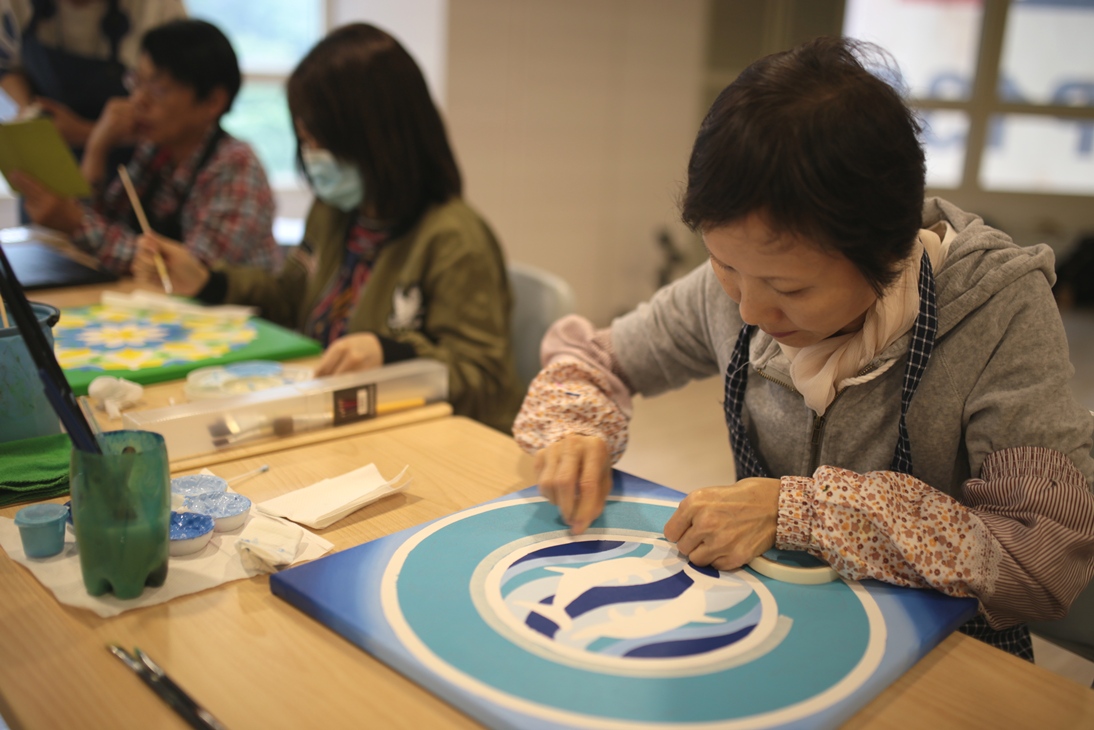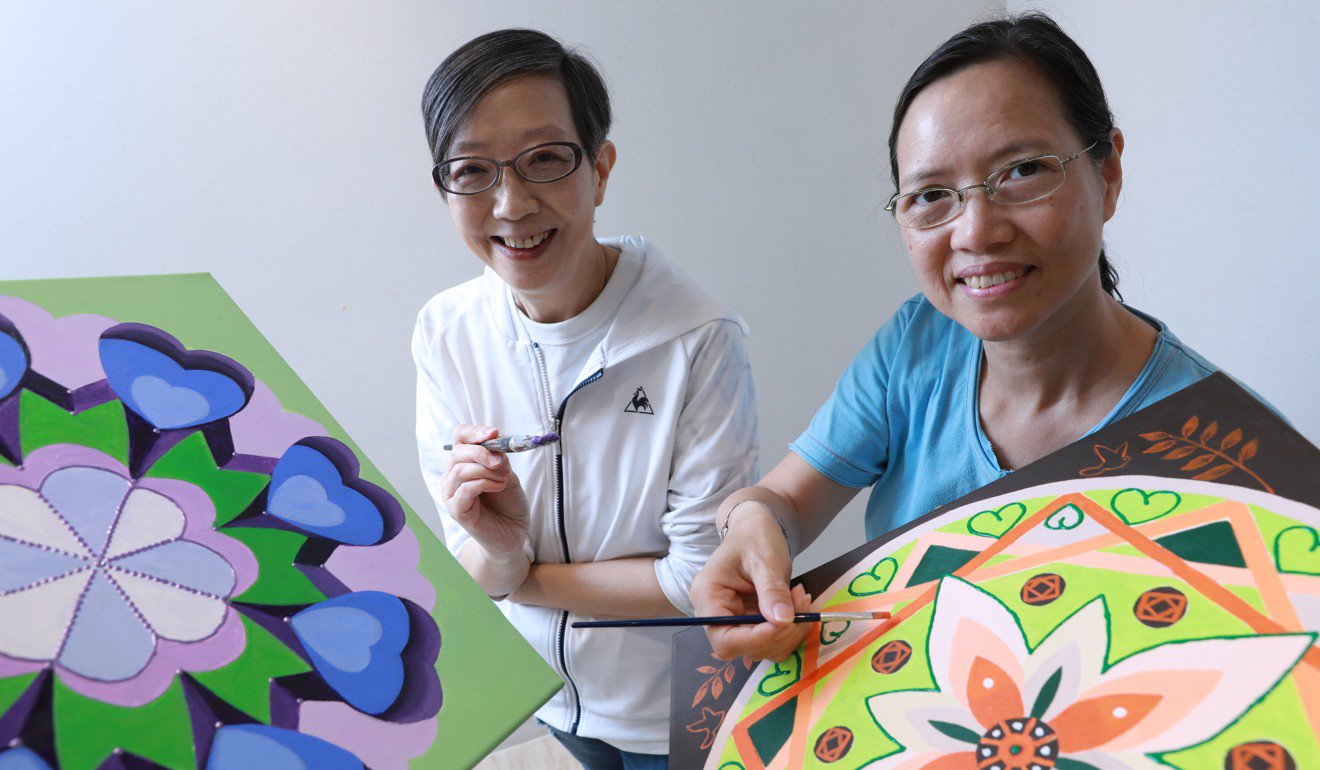Art therapy is increasingly being used around the world to complement cancer treatments as part of a wellness programme
A Hong Kong cancer support organisation is offering three-day mandala making workshops and the artworks are going on display at an exhibition

Mandala therapy is offered by the Hong Kong Cancer Fund’s wellness programme. Photo: courtesy of Hong Kong Cancer Fund
Gera Kwong Ka-lai, a receptionist at a Hong Kong security company, had never picked up a paintbrush or shown any interest in creative arts – until she discovered she had cancer.
When she was diagnosed with stage two breast cancer four years ago, her sister encouraged her to reach out for help from the Hong Kong Cancer Fund’s CancerLink support centres.
“I was the first one in the family to have cancer, so I didn’t know how to handle it or face this problem,” Kwong said.
Established in 1987, the city’s largest cancer support organisation offers information and professional services for people dealing with cancer. Its comprehensive wellness programme includes 60 free daily and weekly activities such as yoga, meditation, qigong, arts healing and more. Mandala art was added to the mix six years ago. “Mandala” means “sacred circle” in Sanskrit. Mandala art often has geometric patterns with a circular shape around a central point, representing the connectivity and continuity of life.
Kwong, now aged 56, underwent an operation, radiation and chemotherapy. At a CancerLink centre a day after a chemo session, she learned about the mandala art workshop and promptly signed up.
The classes in the three-day workshop at a centre in Kwai Chung are small, with about a dozen participants. On the first day, they learn about the many different styles of this expressive art form that is practised in several cultures and sometimes used to aid meditation. Attendees select a pattern and start painting. Silence prevails as an instructor also guides them in meditation.
“The teacher taught us to be aware of our breathing, to try and listen to our breathing and calm ourselves down,” recalls Kwong, who found this soothing.

Cancer patients Heywood Ting (left) and Gera Kwong make mandalas to express themselves and deal with stress and pain. Photo: May Tse
After her operation, she still suffers aches in her left breast. But they melted away during those 10am to 6pm sessions as she was completely absorbed in painting.
“I didn’t feel the pain at all,” says Kwong, who has embraced painting and now does it at home. “I enjoy my journey of painting, I don’t care about the results.”
Kwong’s work will go on public show, as part of the Journey from the Heart exhibition at the H6 CONET at The Centre, 99 Queen’s Road in Central, from June 16 to July 1. It will feature 30 works from 23 cancer patients and survivors who participated in the course over the years, to highlight the benefits of this therapy.
Much research shows that art therapy can help patients cope with chronic illnesses such as cancer. In a study led by Timothy Puetz published in the Journal of American Medical Association Internal Medicinein 2013, researchers analysed more than 27 studies on creative art therapies involving 1,576 cancer patients.
Three key findings were that such therapies reduced anxiety and other psychological symptoms such as depression; there was a significant reduction in pain symptoms; and most importantly, researchers noted an improved quality of life in patients exposed to them.
Art-related therapies are offered by many health care providers and in non-hospital settings around the world as a way to complement cancer patients’ treatments. More than 220 participants have taken part in this mandala arts workshop to date. The assistant manager of the HKCF’s Wellness and Holistic Health Centre, Wang Pin-han, says it is mainly women who are drawn to this course – 94 per cent of wellness programme attendees are female, and that applies to this workshop, too.
Feedback from attendees varies, Wang says, though it is mostly positive. Some say it helped calm and quieten their thoughts, as the activity provided a welcome distraction from the stress, emotions or pain related to their illness. Others say this form of creative expression led to self-discovery or self-healing.
“A lot of them said they had seen their disease or life from a different angle,” Wang adds.
This was the experience of Heywood Ting Mei-Ki, a former associate director at a Hong Kong investment firm. Ting, in her early 60s, was diagnosed with stage one breast cancer in 2004 and her road to recovery involved surgery. She complemented her treatment with traditional Chinese medicine. If all goes well, her annual check-up this autumn will mark 15 years of being cancer-free.
Like Kwong, Ting had never tapped her artistic side until she learned of the mandala workshop. Two years ago, she tried it for the first time.
Her post-cancer life includes regular check-ups which can be stress-inducing. “Waiting for the doctors is always anxious for me, as you’re not sure if the report is good or not,” she said.
After dabbling in mandala arts, Ting developed a more positive attitude towards dealing with cancer. She recalls an early episode in which she was creating a painting dominated by purple hearts.
“I was kind of frustrated,” she recalls. “I was always drawing outside the lines.” Later, she was able to draw a comparison between the activity and managing her illness. “Kind of like getting cancer, painting mandalas gives you some boundaries, it sets perimeters for you to adhere to it,” she said.
These were not unlike the lines health care workers draw for patients like her, to undergo treatments and improve their health. “Within these limitations … if you have an open heart there are still many possibilities.”
Journey from the Heart H6 CONET, The Centre, 99 Queen’s Road Central, June 16 to July 1. For more information on the wellness programme activities or the Journey from the Heart exhibition, visit cancer-fund.org, tel: 3656 0800

Helpline
Tel: (852) 3656 0800
Donation Hotline
General donation:(852) 3667 6333
COF Monthly donation:(852) 3667 6332 
- Questions or comments: please use our comments page
- Donation enquiries: [email protected]
- Media enquiries: [email protected]
- Fundraising enquiries: see Get Involved



